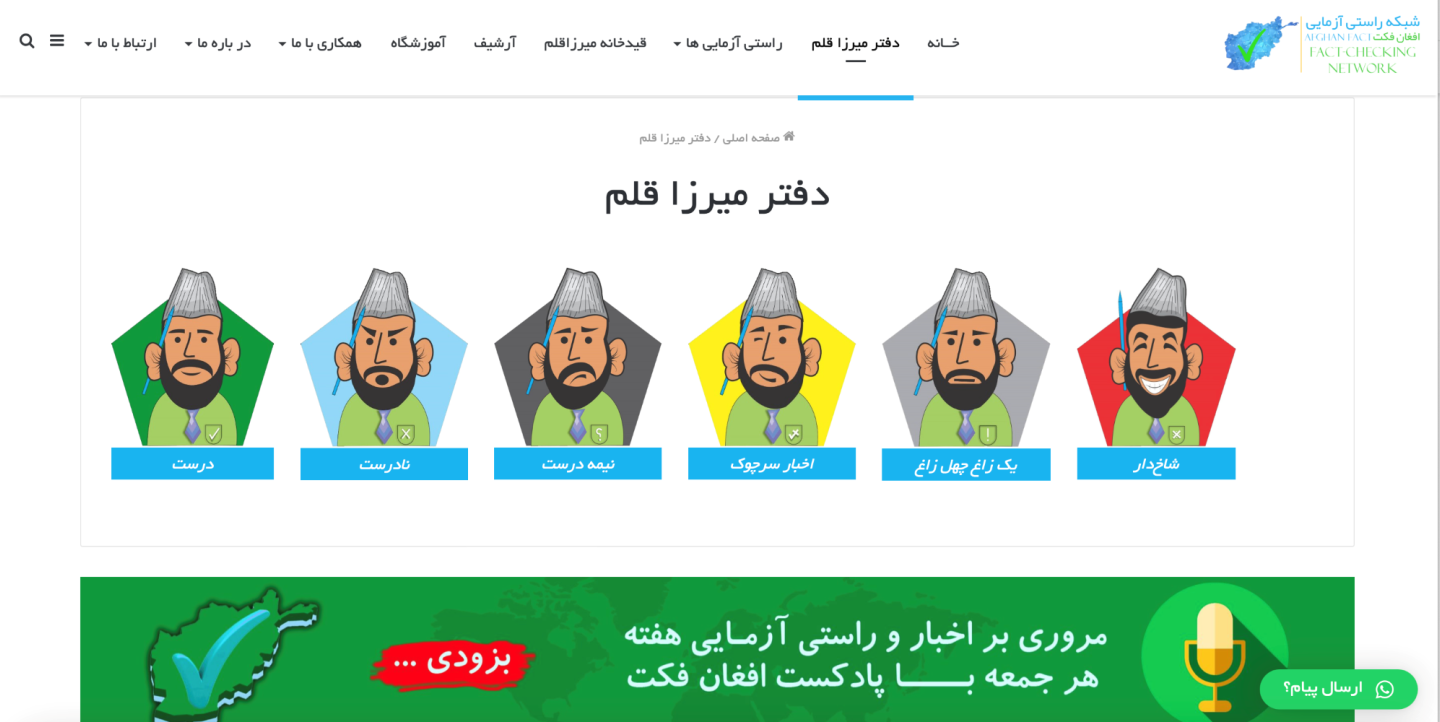At the end of 2022, an Afghan journalist sent his colleagues an IJNet Persian article on fact-checking and verification. The piece came with a recommendation: that they should launch a website focused on fact-checking in Afghanistan.
This email led directly to the creation in February 2023 of Afghan Fact, a fact-checking and verification website that arrived amid a severe shortage of journalism resources for Afghan journalists following the post-2021 collapse of independent Afghan media.
Some 43% of newsrooms that were operating in 2020, before the Taliban’s takeover of Afghanistan, have since left the country, according to Reporters Without Borders. In December 2023, BBC Persian cited the Afghanistan Journalists Support Organization as reporting that two-thirds of the 12,000 Afghan journalists who were active before the Taliban’s 2021 return to power are no longer working in Afghanistan. A large number of journalists have left the country while some can no longer work due to the regime’s various restrictions, such as the limitations it has set for female journalists.
I spoke with the journalists behind Afghan Fact about their work, how Afghan Fact operates, and the state of media in Afghanistan today. For this interview, they wished to remain anonymous out of concerns for their safety amid imprisonment and violence targeting journalists under the Taliban.
How many people work on Afghan Fact?
At the moment, we have a staff of 11 journalists, two administrators and two technical workers. We all work full-time.
How do you fund your website?
We don't really have many financial resources. Some of us work as volunteers, and some get paid [as employees]. Thankfully, a lot of our expenses are paid for by our colleagues, particularly a number of exiled Afghan journalists.
Everyone working or helping on the team is serious about making efforts to advance Afghan society's media intelligence, part of which is understanding the process of fact-finding and verification.
Do you gather in a physical office space to work?
Unfortunately not yet, although we [previously] had plans to officially open an office in Kabul. However, we have managed to regularly gather in a certain place – anywhere we can – and work together, [although] a number of our colleagues are based outside Afghanistan.
Our work was disrupted on January 13, 2024 due to security issues, and we have temporarily stopped some of our work. We are making efforts to restart our work in a safer environment.
How does your team operate?
Our focus is Afghanistan. We pick certain reports or quotes [from officials or news reports] to work on.
[On our team], three journalists work on the gathered facts, each of whom verifies and peer edits the previous person's work. The collected facts are then examined by an editor, who gives the report or quote a rating.
The rating is based on how truthful the report is, and is labeled as one of the following: accurate, semi-accurate, inaccurate, not entirely believable, exaggerated, or totally false.
What do you think is the most significant challenge that journalists face in Afghanistan today?
Since the fall of the [pre-Taliban] Republic, economic obstacles are among the biggest challenges for the continued activity of Afghan media.
Another issue is the fact that Afghan journalists face a shortage of reliable sources and accurate information. Emigration and the change in government systems have caused journalists to grapple with a shortage of news sources, as state media only reflect the Taliban's viewpoints and are managed according to the Taliban's orders.
How has IJNet helped you understand the important details of fact-checking and verification, and how has it come to exist as a resource for Afghan journalists?
Our main and most significant source for understanding the process of verification and fact-finding has been IJNet Persian. We managed to prepare our charter in two months and launched our site last February [2023].
Sadly, the Taliban government has not issued a permit for our activity as of yet, but we were able to register our network as a nonpolitical nonprofit in the U.S. We are currently awaiting our International Fact-Checking Network license [as well].
How have you benefited from IJNet during your journalism career?
IJNet, specifically IJNet Persian, is a unique journalism website which is managed very creatively and according to journalists' needs. The articles that appear on this site are immeasurably helpful for us and for all Persian-language journalists. We follow IJNet Persian closely, as there is no similar website available.
We read all the content and learn from it – it‘s like having your personal journalism tutor.
What is your advice for new or aspiring investigative journalists?
Our belief is that investigative journalists should constantly update their knowledge and skills. As technology advances and facilitates people’s access to communication and information, misinformation and false news also spreads. The more investigative journalists familiarize themselves with new trends and strengthen their journalistic skills, the better equipped they are for distinguishing facts from inaccurate information or false news.
Other than IJNet, ICFJ's YouTube channel is also very informative for journalists.
How have you benefited from ICFJ’s Disarming Disinformation program and its master classes that were held each of the past two years?
The master classes were highly useful to us and familiarized us with tools and software that help us greatly in fact-checking and verification. The most important topic for us was becoming familiar with websites and plug-ins that were helpful for verification purposes.
Other educational parts of these courses [included] best methods for verifying photographs and the best ways to use open source content for investigation.
Our other important takeaway from the courses was useful knowledge for fundraising and monetizing professional journalism.
Main image is screenshot of Afghan Fact website.


